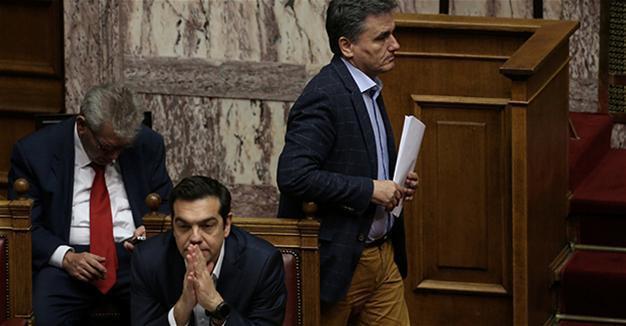Greece appeals to creditors to approve debt relief measures
ATHENS - Agence France-Presse

Greece told its EU-IMF creditors on May 21 there should be “no excuse” for delays to debt relief payments now that Athens has “fulfilled its obligations” with new austerity cuts.
The appeal came on the eve of a meeting of eurozone finance ministers in Brussels that will discuss the issue.
“Our country by adopting the new measures through the Greek parliament has fulfilled its obligations totally and on time,” Finance Minister Euclid Tsakalotos said in a statement carried by the Athens News Agency.
“There is no excuse for further delay on the issue of the debt relief”.
The Greek parliament late May 18 adopted a new round of austerity cuts which the government hopes will secure a pledge of debt relief and loan disbursements by EU-IMF creditors.
The bill entails 4.9 billion euros ($5.4 billion) in pension cuts and lower tax breaks in 2018-2021 and was passed by a majority of 153 lawmakers from the ruling coalition.
“The decisions are now in the hands of the institutions in order to pave the way for our access to the QE (European Central Bank’s asset purchase program), and our return to bond markets”, Tsakalotos said.
The question of debt relief has served as a point of contention for months between Berlin and the IMF, which does not want to participate in the bailout program unless Greece’s debt burden is brought down to manageable levels.
In his calls for substantial debt relief, Greek Prime Minister Alexis Tsipras faces resistance from Germany, where additional concessions are unpopular with an electorate called to a general election in September.
According to sources familiar with the matter, the IMF and eurozone countries are close to reaching a compromise, which would clear the way for a global agreement allowing Greece to return to bond markets in 2018.
Athens also hopes to be finally allowed access to the European Central Bank’s asset purchase program, known as quantitative easing, or QE, to help its return to bond markets.
 Greece told its EU-IMF creditors on May 21 there should be “no excuse” for delays to debt relief payments now that Athens has “fulfilled its obligations” with new austerity cuts.
Greece told its EU-IMF creditors on May 21 there should be “no excuse” for delays to debt relief payments now that Athens has “fulfilled its obligations” with new austerity cuts.